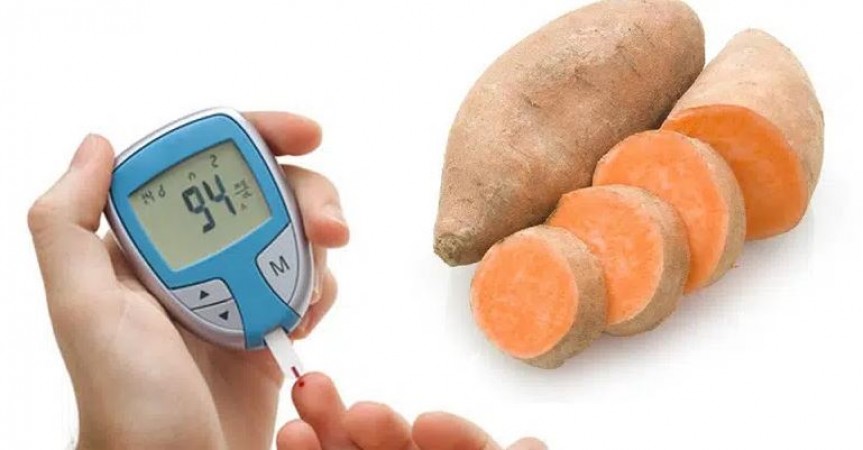
During the winter season, nutritional foods flood the market, all claiming to offer significant health benefits. However, for individuals with diabetes, choosing the right foods can be confusing and critical, as even a minor dietary mistake can lead to a spike in blood sugar levels, posing serious health risks. Sweet potatoes are a popular winter vegetable enjoyed in various forms by many, but the question remains - is it safe for diabetes patients? Let us know what the experts say?...
Nutrients in Sweet Potatoes
Sweet potatoes are rich in essential nutrients, making them a potential addition to a healthy diet. They contain vitamins A, B, C, D, protein, fiber, carbohydrates, healthy fats, calcium, magnesium, potassium, phosphorus, carotenoids, and thiamine, among others. These nutrients offer a wide range of health benefits, but the natural sweetness of sweet potatoes can deter individuals with diabetes from consuming them.
Sweet Potatoes for Diabetes Patients
The decision to include any food in a diabetic diet revolves around its glycemic index (GI). High-GI foods can be dangerous for individuals with diabetes, as they can lead to rapid blood sugar spikes. Sweet potatoes, being a source of carbohydrates, often raise concerns among those with diabetes due to their natural sweetness.
How to Consume Sweet Potatoes
Consuming sweet potatoes in a diabetes-friendly manner involves careful preparation and understanding their impact on blood sugar levels. Here's a more detailed explanation of how to consume sweet potatoes:
Boiling with Skin On:
Boiling sweet potatoes with their skin on is considered the most diabetes-friendly method of preparation. The skin acts as a natural barrier that helps slow down the absorption of carbohydrates in the sweet potato. This, in turn, prevents rapid spikes in blood sugar levels. To do this:
Wash the sweet potatoes thoroughly to remove any dirt or impurities from the skin.
Place the whole sweet potatoes in a pot of boiling water and cook them until they become tender. This usually takes about 20-30 minutes, depending on their size.
After boiling, allow them to cool, and then you can easily peel off the skin or leave it on, according to your preference.
Roasting:
Roasting sweet potatoes is another suitable method for diabetes patients. Roasting enhances the natural sweetness and flavor of sweet potatoes while maintaining their nutritional value. Here's how to roast sweet potatoes:
Preheat your oven to around 400°F (200°C).
Scrub and clean the sweet potatoes thoroughly.
Cut them into uniform-sized pieces to ensure even cooking.
Toss the sweet potato pieces in a small amount of heart-healthy oil, such as olive oil or avocado oil.
Season with your preferred herbs and spices, such as rosemary, thyme, or cinnamon, to add flavor without relying on excessive sugar or salt.
Spread the sweet potato pieces on a baking sheet in a single layer.
Roast them for approximately 30-40 minutes, turning them occasionally, until they become tender and slightly caramelized.
Mashing or Pureeing:
Mashing or pureeing sweet potatoes is an excellent way to create a creamy and delicious side dish that is suitable for diabetes management. To prepare mashed or pureed sweet potatoes:
Boil or roast the sweet potatoes as mentioned above.
Remove the skin if desired.
Mash or puree the sweet potatoes using a potato masher, food processor, or blender.
For added flavor, consider incorporating spices like cinnamon, nutmeg, or a touch of unsweetened almond or coconut milk for creaminess.
Avoid Frying:
Frying sweet potatoes in oil, whether deep-fried or pan-fried, is not recommended for individuals with diabetes. Deep frying can cause the sweet potatoes to absorb a significant amount of oil, making them high in unhealthy fats. This can lead to an increase in bad cholesterol levels, which is detrimental to overall health, particularly for diabetes patients.
In summary, sweet potatoes are a nutritious food that can be included in a diabetes-friendly diet when prepared correctly. Boiling sweet potatoes with their skin on is a recommended way to minimize the impact on blood sugar levels, thanks to their low glycemic index. By making the right choices in food preparation, individuals with diabetes can enjoy the benefits of sweet potatoes during the winter season without compromising their health. Remember, moderation is key, and it is advisable to consult a healthcare professional or dietitian for personalized dietary recommendations tailored to your specific health needs.
World Egg Day 2023 Celebrating the Incredible Egg on October 13
The Satvik Thali at Courtyard Marriott for Navratri: Wholesome, Local, and Sattvik
Safeguarding Your Child's Vision: A Full Guide to Screening Strategies for Children's Eye Health